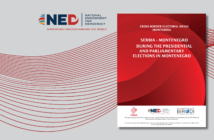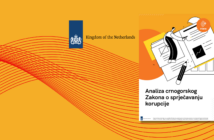The public has no information on how nearly half a million euros allocated from the budget to finance the regular work of women’s organisations within political parties was spent.
Even though the parties were duly paid funds in 2020 for financing of the regular work of women’s organisations, almost no party submitted a report on the manner in which these funds were spent, although they are obliged to do so by the Law on Financing Political Entities.
The Law on Financing prescribes the condition that funds for the regular work of women’s organisations be used only in line with the statute of those organisations. However, most parties either do not have a special statute of their women’s organisation, or it is not publicly available
Although the parties did not fulfil their legal obligation to report on how money for the work of women’s organisations was spent, the Ministry of Finance did not discontinue the payments to parties that did not act in accordance with the law.
The Ministry of Finance did not regularly report on its website on payments from the budget for financing women’s organisations within political entities, although it is required by law to publish information on such expenditures until the fifth of the month for the previous month.
The Ministry of Finance also did not update the form prescribing the type of
financial statement so as to include the obligation to report on the spending of money for regular work of women’s political organisations, prescribed by the new Law on Financing Political Entities and Election Campaigns. Instead, political parties still submit their annual financial statements in accordance with the old, invalid law on financing, on the form from 2012.
The provisions of the law governing the financing of the regular work of political entities stipulate that the funds shall be distributed among the parties which participated in the elections as a coalition according to the coalition agreement, which leaves room for part of the funds to be distributed in proportion to the number of elected representatives of the less represented gender (20% of the total amount allocated for the regular work of political entities) to be also given to parties that do not have any women among their MPs.
The law does not provide a way to sanction a political entity that did not win a single seat in the last election and which received money for the work of women’s organisations in the election year, the spending of which it did not report in its annual financial statement.
The law does not stipulate the obligation of parties to report specifically on the manner in which they spent 20% of the funds awarded from the budget in proportion to the number of elected MPs to ensure political empowerment of women as the main goal pursued by this provision.
Provisions of the law that financially stimulate political parties to work towards the political empowerment of women have so far not contributed to the increase in the number of women in the Parliament. On the contrary, after the last parliamentary elections, the number of women elected to the Parliament was lower than after the previous elections, which indicates the need to further improve the legal framework in this regard.
Complete publication download HERE (PDF)



